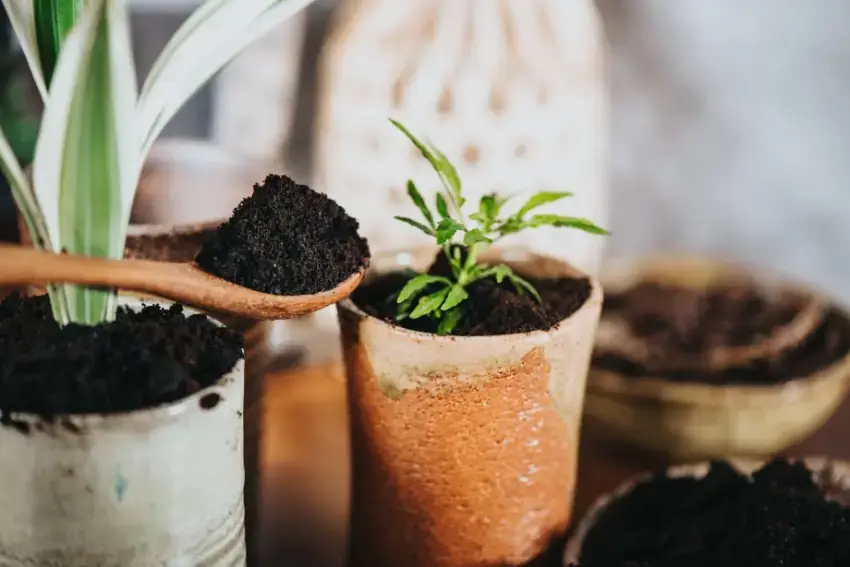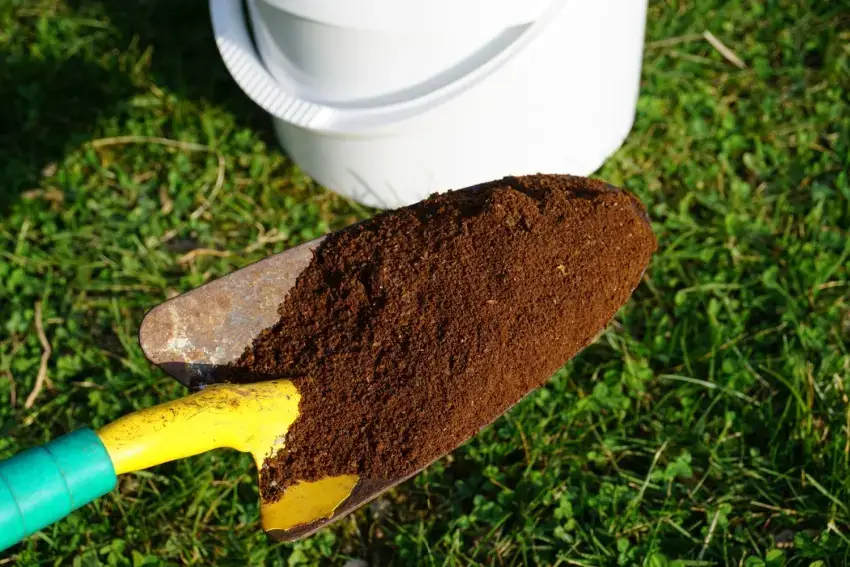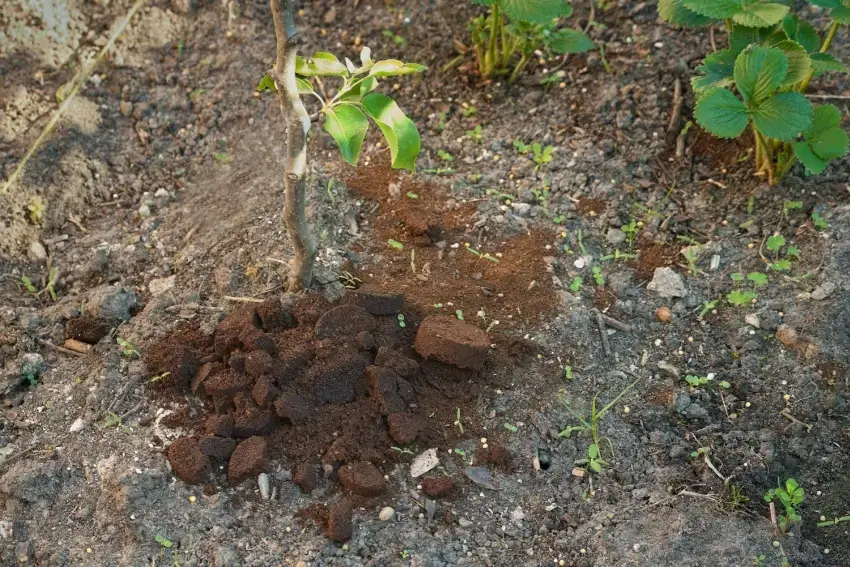
According to The Grounds Guys, coffee grounds can benefit your garden when used properly. Key benefits include:
|
Do you need your morning cup of joe to get through the day? It turns out that your plants and garden may also benefit from a stimulating dose of coffee…or at least the grounds. Are coffee grounds good for plants? Many anecdotal stories and personal opinions say yes, but the truth about coffee grounds for plants is more nuanced.
Before you start powdering your garden with your used coffee grounds, make sure you understand exactly how these grounds interact with soil and how best to use coffee grounds to benefit your landscape.
Table of Contents:
Do Coffee Grounds Help Plants? Rumours vs. Reality
You may have heard that you can mix coffee grounds directly into the soil of your garden. Reality is more complicated.
While coffee grounds are packed with nitrogen, an essential nutrient that promotes healthy plant growth, they are also acidic, which can make adding them directly to soil a risky proposition. Adding coffee grounds to your dirt could change the pH of your soil and even do more harm than good to your plants.
Another popular rumour is that coffee grounds can ward off annoying garden pests like slugs, snails, and ants. The truth? No studies have validated these claims.
How to Use Coffee Grounds in Your Garden

So, if adding coffee grounds directly to the soil of your garden isn’t ideal, is there any use at all for your leftover grounds?
Absolutely. If you want to use coffee grounds in your garden, we suggest doing it through composting. The best ratio for composting is one part “green” to four parts “brown.” Coffee grounds, along with other nitrogen-rich organic matter like food scraps, belong in the green category. Pair your coffee grounds with four times that amount of leaves, twigs, grass shavings, and other carbon-rich sources to create a potent compost that will balance out the acidic nature of the coffee grounds.
Making compost takes practice, so do your homework and have patience. You may need to endure some trial and error before you perfect your method.
Coffee Grounds Benefits for Plants
Coffee grounds are worth saving and adding to your compost, especially if you drink coffee regularly and have access to free coffee grounds:
Nutrient Rich
Coffee grounds are chock full of nitrogen but also contain potassium and phosphorus, which can improve soil fertility and help plants grow big and strong. Mixed in with compost, coffee grounds as fertilizer is a winning recipe.
Better Water Retention
Coffee grounds can absorb and retain water, keeping the soil moist during dry conditions. This can be especially useful in areas that are more prone to drought, like the Prairie provinces.
Healthy for Earthworms
Earthworms are big fans of coffee grounds, which can help them better digest their food. In the right concentration, coffee grounds can attract these beneficial soil dwellers to your gardens and plant beds. You can also add coffee grounds to your vermicomposting process (i.e., using worms to create compost).
Eco-Friendly
If you already drink coffee in your household, you can put those leftover grounds to good use. Rather than sending them to a landfill, using them in compost is a low-cost and environmentally sustainable way to improve the health of your garden and get the most out of your coffee.
Are Coffee Grounds Good for All Plants?
Simple answer? No. Coffee grounds are acidic, which means they are a less-than-ideal soil amendment for plants that don’t love acidic soil. Acid-sensitive plants include lavender, rosemary, and sage, just to name a few. Additionally, the caffeine content of coffee grounds can damage seedlings and young plants. While it may give you the kick start you need in the morning, young plants and seedlings are much more sensitive to a high concentration of caffeine.
Finally, if your soil is already acidic, you probably don’t want to add anything that will raise its pH. Adding coffee grounds directly to your soil can be tricky, so you’ll need to understand your current soil pH and the characteristics of your plants to ensure the coffee grounds do more good than harm.
That said, if your soil is more alkaline (a pH level above 7) or you’re growing plants that love acidity, you may be just fine mixing coffee grounds directly into your soil. A few plants that enjoy acidic soil include azaleas, rhododendrons, and hydrangeas.
Practical Tips for Gardening with Coffee Grounds
If you do decide to use coffee grounds for plants by directly mixing them into the soil, here are a few best practices to consider.
Test Your Soil
Before mixing coffee grounds and gardening, you must understand your soil pH. You can find consumer-friendly soil tests at most major home improvement stores or gardening centres. If your soil is already acidic, it’s probably not a good idea to mix coffee grounds directly into your soil, unless you know how to amend the soil.
Collect and Dry your Coffee Grounds
If you drink coffee at home, you’ll have a ready supply of grounds on hand. If not, many coffee shops give away coffee grounds for free. Once you’ve collected your grounds, spread them out in a thin layer on a tray and allow them to dry completely before use. This will prevent them from getting mouldy and make them easier to use.
Add to Your Garden or Plants

Once your coffee grounds are dry, sprinkle them directly onto the soil around your plants. Gently mix the grounds into the top few inches of soil using your hands or a trowel. Don’t use too many grounds—a little goes a long way.
Test and Monitor
It’ll take time for the coffee grounds to break down and begin impacting your soil. Several months after mixing the grounds into your soil, re-test to ensure your soil pH isn’t shifting too high. Monitor your plants. Excessive nitrogen in the soil from coffee grounds may lead to overgrowth of leaves at the expense of fruit and flowers.
Other Ways to Help Your Lawn and Garden Thrive
Coffee grounds as a fertilizer can be a big boon for certain plants in certain types of soil.
However, if you don’t have the time or patience to ensure you’re doing it right or you’re afraid you’ll do more harm than good, contact us at The Grounds Guys®.
Our local teams are garden and lawn care experts. We know just what your lawn and garden needs to stay healthy and thrive. We can help you plan and build a garden from scratch or take over the care of your existing garden. We perform residential garden and bed maintenance, garden clean-ups, seasonal services, and more.
Have the garden you deserve. Request an estimate today.